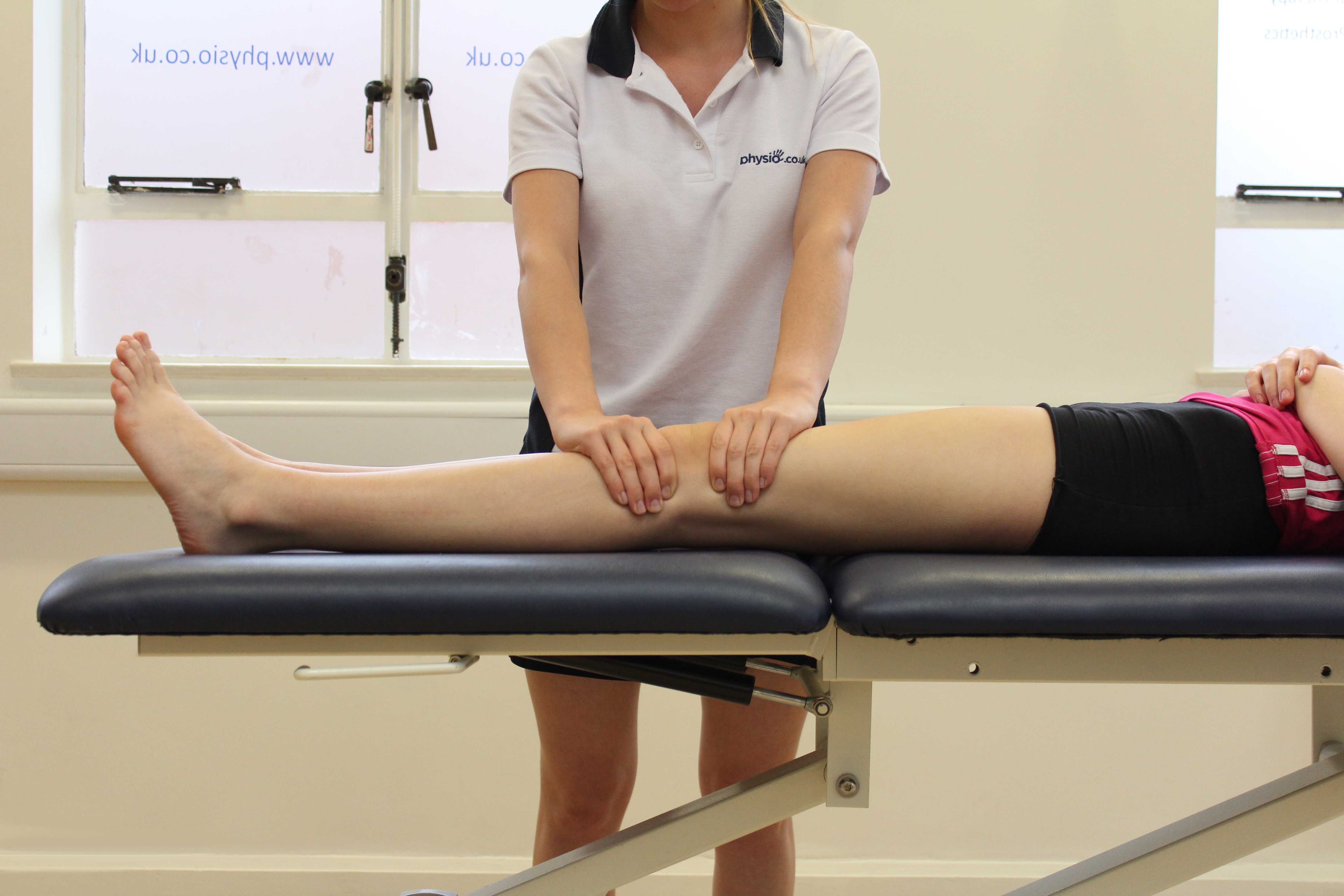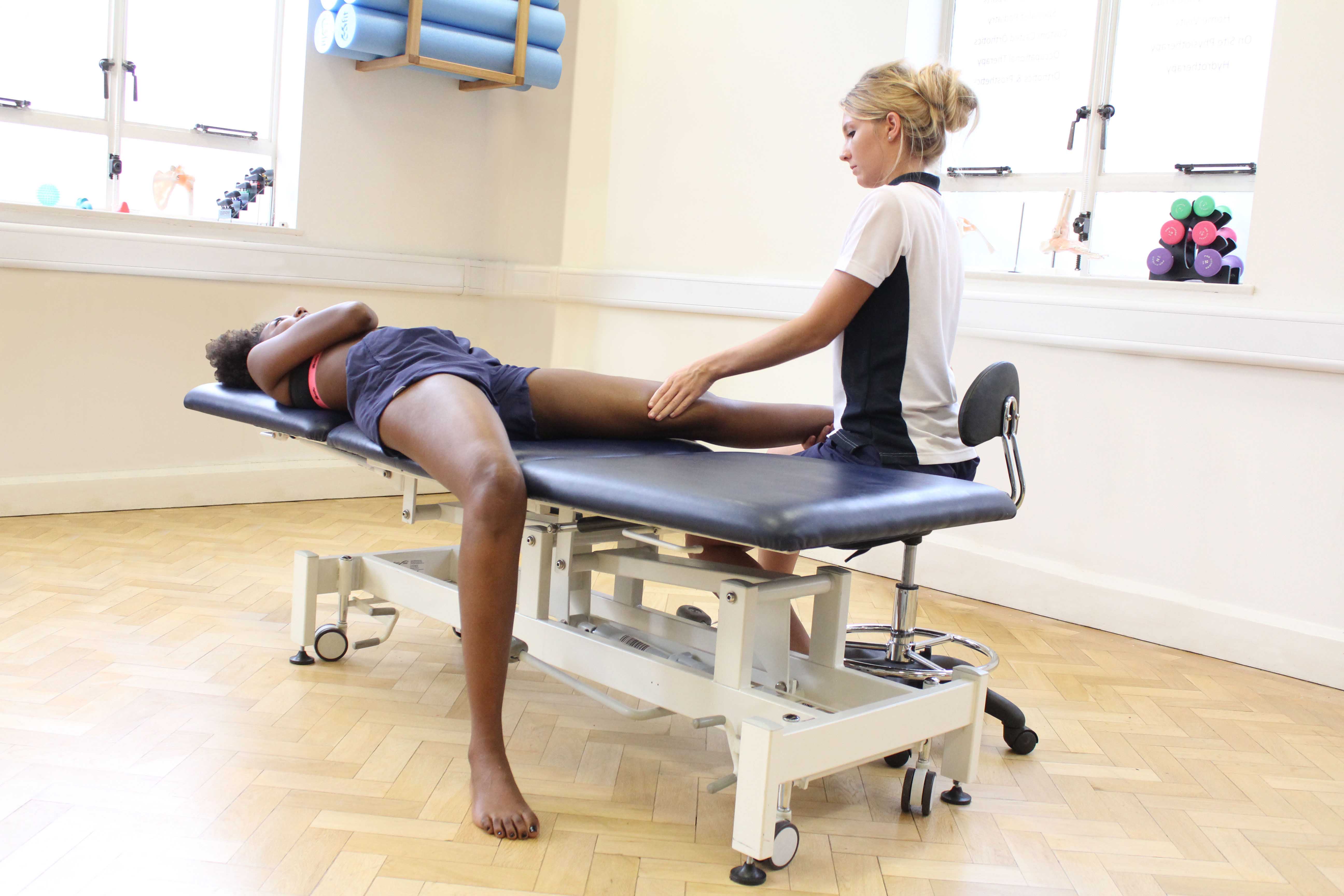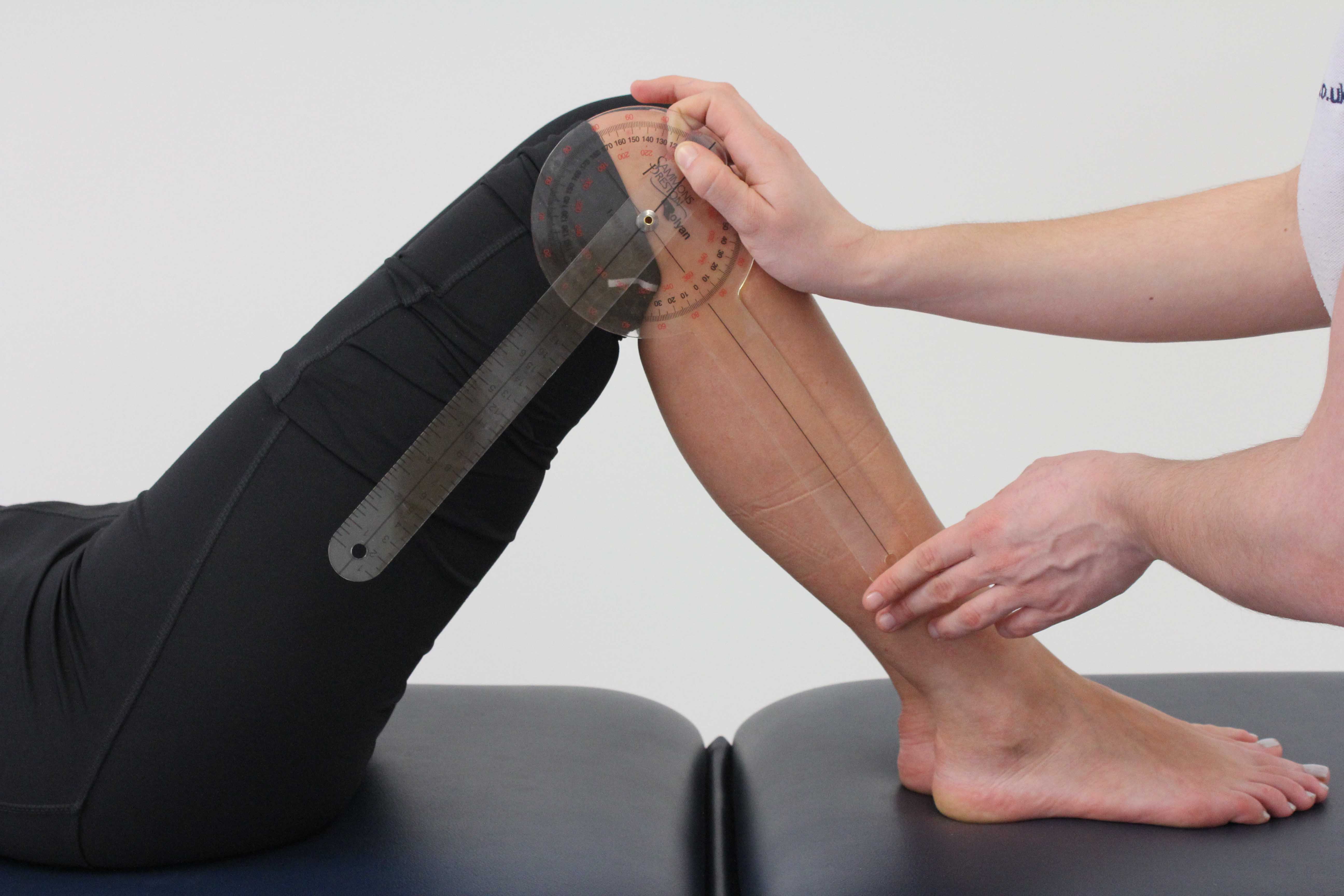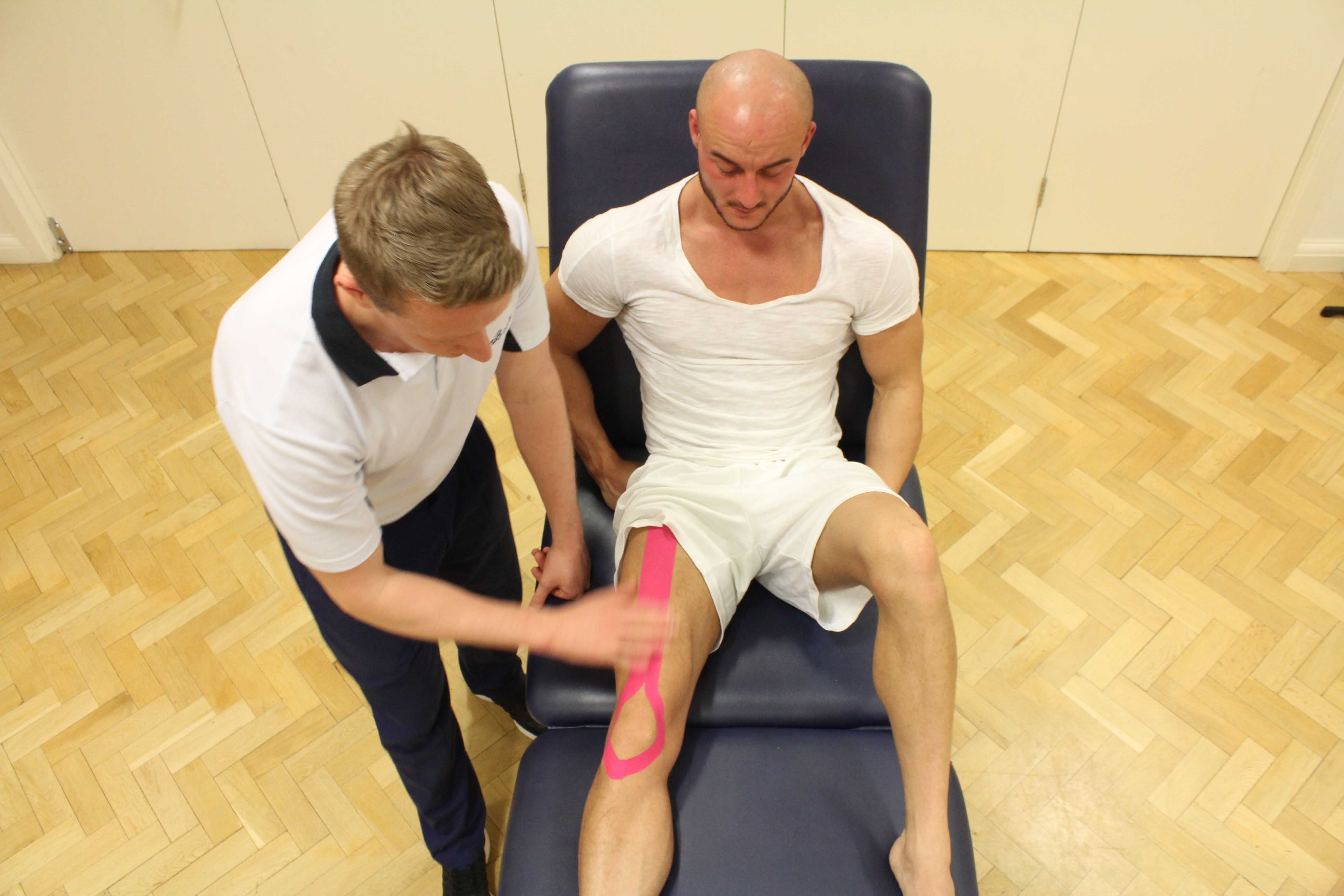LCL surgery
Lateral collateral ligament (LCL) surgery involves the repair or reconstruction of the LCL after injury.
The lateral collateral ligament (LCL) is the main supporting structure on the outside of the knee. It is one of the four main ligaments that provide stability to the knee joint. An injury to the LCL can be cause by a force exerted on the inside of the knee, pushing the knee outwards and therefore over stretching the LCL. An LCL injury can be classified by three different degrees depending on the severity of the damage.
 Above: Patella mobilisations performed by MSK Physiotherapist
Above: Patella mobilisations performed by MSK Physiotherapist- Grade I: Mild stretching of the ligament
- Grade II: Partial tear of the ligament
- Grade III: Complete tear or rupture of the ligament
If the damage to the LCL is of a higher degree then surgery may be required to directly repair the damage or to reconstruct the ligament itself. In many cases, surgery to the LCL is essential when other structures in the knee have been damaged at the same time such as a posterior cruciate ligament (PCL) injury or multiple ligament injuries (knee dislocation). Surgery to the LCL will be done arthroscopically (key hole) and will involve repairing the LCL using surgical sutures (stitches) or replacing the LCL with grafts from the hamstring tendon or using an allograft (donor). Surgery after severe LCL damage will ensure the full, or near full, return of knee function and stability.
 Above: Friction massage of the connective tissues around the knee
Above: Friction massage of the connective tissues around the kneePhysiotherapy for surgery
Physio.co.uk recommends that prior to your LCL surgery you carry out a specific pre-operative physiotherapy programme that will help prepare you for your surgery and aid your recovery afterwards. Physiotherapy with Physio.co.uk before LCL surgery aims to reduce pain and swelling, strengthen the muscles in and around your knee and increase range of movement. It is also necessary to strengthen the muscles in your hip and ankle whilst also strengthening muscles in your opposite, uninjured leg to provide support for your injured knee.
 Above: Knee joint assessment using a goniometer
Above: Knee joint assessment using a goniometerSymptoms after surgery
After you have undergone LCL surgery you will experience pain and swelling around the LCL and surgical incision. You will also be suffering from a significant amount of stiffness and loss in range of movement in your knee joint. Adherence to your physiotherapy programme before your surgery will have helped to reduce this as much as possible. You will be given elbow crutches for first week after surgery and you will be unable to drive during this time. You will also be given a brace to use
 Above: Use of taping to assist stability during knee strengthening exercises
Above: Use of taping to assist stability during knee strengthening exercisesPhysiotherapy after LCL surgery
Early stages of rehabilitation
During the early stages of your rehabilitationonce you have undergone LCL surgery, Physio.co.uk will aim to reduce your pain, swelling and stiffness and further improve range of movement in your knee. You will start of partially weight bearing and progress to full weight bearing as much as possible. Your physiotherapy programme will also aim to strengthen muscles around your injured knee, whilst also strengthening your hip, ankle and opposite leg to give your knee support during your recovery. Your physiotherapy at this stage will include:
- Cryotherapy (ice) before and after activities
- Compression and elevation
- Knee brace to provide protection and support
- Early ambulation (walking)
- Gait re-education
- Partial to full weight bearing exercises as tolerated
- Range of movement exercises
- Strengthening of quadriceps and hamstrings
- Stretching of quads, hamstrings and calf muscles
- Strengthening of hip, ankle and muscles in uninjured leg
- Hydrotherapy
Later stages of rehabilitation
Following successful rehabilitation in the earlier stages of your recover, your physiotherapy programme with Physio.co.uk will now progress the activities from previous weeks whilst also gearing towards more sport / activity specific activities. Also, to aid the healing process and strengthen the ligament once your wound from your surgery has healed, Physio.co.uk may include electrotherapy such as ultrasound during your physiotherapy. Rehabilitation activities at this stage will include:
- Continuation of strengthening exercises for quadriceps and hamstrings and other lower limb muscles
- Progressed range of movement exercises
- Full weight bearing activities
- Stretching of quadriceps, hamstrings and calf muscles
- Proprioception training (balance)
- Gait re-education training
- Electrotherapy (ultrasound)
- Agility exercises (changing direction)
- Static bicycle (resistance as tolerated)
- Hydrotherapy
- Activity / sport specific exercises
Summary
LCL surgery is the repair or reconstruction of your lateral collateral ligament (LCL) after it has been severely injured. If the injury to the LCL injury is of a mild degree then surgery is not required and a more conventional approach consisting of a specific physiotherapy programme will be recommended. If the damage to the LCL is of a much higher degree and causing a considerable amount of pain and instability in the knee joint then surgery is necessary to repair or reconstruct the damaged ligament. Surgery in this case can be effective to improve stability and reduce the chance of long term damage such as arthritis in the knee. Physiotherapy before and after surgery to the LCL is critical as this will ensure the success of the surgery, prevent any further damage or injury and further guarantee a more rapid recovery. Physio.co.uk will offer you a personal physiotherapy programme that will return the full function of your knee and get you back to your job, hobby or sport as soon as possible. Call Physio.co.uk now on 0330 088 7800 for more information or to book an appointment!

 0330 088 7800
0330 088 7800





































